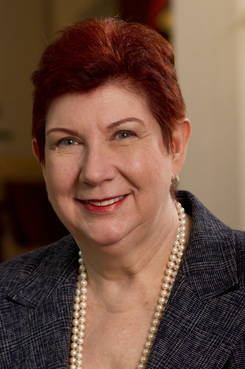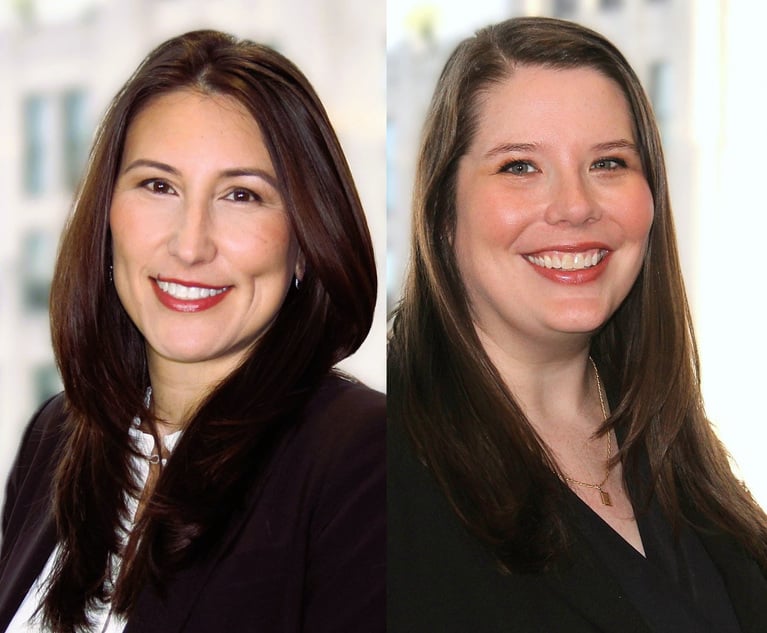'Take Your Adversary to Lunch' Can Pay Off Down the Line
The Atlanta Bar Association encourages members to take an adversary to lunch at this time of year to encourage civility and professionalism. It also can be taken as a chance to demonstrate character, build reputation and develop business.
February 16, 2018 at 12:30 PM
4 minute read

For years, the Atlanta Bar Association has encouraged its members to take an adversary to lunch at this time of year. The idea is to encourage civility and professionalism, but it also could be regarded as an exercise in business development.
Getting to know a lawyer you usually regard as an adversary makes it easier for the two of you to refer business to each other or suggest that others do so. All things being equal, most of us would rather do business with someone we like and who treats us with respect. I know some litigators and other lawyers believe being a jerk commands the respect of colleagues, but actually it just earns you a reputation of being hard to work with.
“Take Your Adversary to Lunch” takes place during February this year. Members who participate can enter a drawing for gift cards from the Buckhead Life Group restaurants. The top prize is two $200 gift cards, one for the Atlanta Bar member and one for the adversary. Members can submit up to five entries if they take that many adversaries to separate lunches.
Todd Poole hasn't won a gift card by taking an adversary to lunch, but he has built relationships. Poole, the founding member of the law firm Poole Huffman, remembers the first time he participated in the program. It was 2010, a year after he had founded the firm, and he was working hard to create his personal brand. He was involved in a contentious case and reached out to his adversary, who suggested dining at a country club where he was a member. Poole jokes that the country club was an aspirational destination for him at the time.
The lunch went well, with trust built on both sides. While it didn't immediately lead to a referral, he credits the rapport built during lunch with allowing the parties to come to a resolution. Later, he received a call from a client referred by opposing counsel. Poole says his lunch experience demonstrated that opportunities to build a relationship with an adversary can improve both the case and lead to business in the future. Since then, he's looked for opportunities to get to know more colleagues that he used to consider on the “other side.”
“We run into the same people time and again,” Poole says. “It's a small community when it boils down to it.” When there is a break in a deposition or before a court session begins, he often will chat with his adversary. The conversation could be about other cases or family life or Georgia football. “A lawyer can't in good conscience refer a client if they haven't spoken to me and gotten to know me,” he says.
Poole is ever alert for opportunities to promote his practice. He may mention that he does collections, one of his firm's niche practices and an area where many firms look for help.
Not that it's always “Kumbaya” between Poole and opposing counsel. “Look, we're not above getting frustrated with opposing counsel,” Poole says, but it has become easier for him to check himself. He may place a letter to opposing counsel in his desk for the night before, rereading it in the morning for tone. Given the pace of communications in a digital world, that is not always feasible. When it needs to be sent that day, he will ask a colleague to read the email or letter to make sure it strikes the right tone, which he defines as “professional.”
Don't underestimate what your reputation means in the legal community. Good character is its own reward, but it's also good for business.
Robin Hensley's column is based on her work as president of Raising the Bar and coaching lawyers in business development for more than 25 years. She is the author of “Raising the Bar: Legendary Rainmakers Share Their Business Development Secrets.”
This content has been archived. It is available through our partners, LexisNexis® and Bloomberg Law.
To view this content, please continue to their sites.
Not a Lexis Subscriber?
Subscribe Now
Not a Bloomberg Law Subscriber?
Subscribe Now
NOT FOR REPRINT
© 2025 ALM Global, LLC, All Rights Reserved. Request academic re-use from www.copyright.com. All other uses, submit a request to [email protected]. For more information visit Asset & Logo Licensing.
You Might Like
View All

CFPB Proposes Rule to Regulate Data Brokers Selling Sensitive Information
5 minute read
Trending Stories
Who Got The Work
J. Brugh Lower of Gibbons has entered an appearance for industrial equipment supplier Devco Corporation in a pending trademark infringement lawsuit. The suit, accusing the defendant of selling knock-off Graco products, was filed Dec. 18 in New Jersey District Court by Rivkin Radler on behalf of Graco Inc. and Graco Minnesota. The case, assigned to U.S. District Judge Zahid N. Quraishi, is 3:24-cv-11294, Graco Inc. et al v. Devco Corporation.
Who Got The Work
Rebecca Maller-Stein and Kent A. Yalowitz of Arnold & Porter Kaye Scholer have entered their appearances for Hanaco Venture Capital and its executives, Lior Prosor and David Frankel, in a pending securities lawsuit. The action, filed on Dec. 24 in New York Southern District Court by Zell, Aron & Co. on behalf of Goldeneye Advisors, accuses the defendants of negligently and fraudulently managing the plaintiff's $1 million investment. The case, assigned to U.S. District Judge Vernon S. Broderick, is 1:24-cv-09918, Goldeneye Advisors, LLC v. Hanaco Venture Capital, Ltd. et al.
Who Got The Work
Attorneys from A&O Shearman has stepped in as defense counsel for Toronto-Dominion Bank and other defendants in a pending securities class action. The suit, filed Dec. 11 in New York Southern District Court by Bleichmar Fonti & Auld, accuses the defendants of concealing the bank's 'pervasive' deficiencies in regards to its compliance with the Bank Secrecy Act and the quality of its anti-money laundering controls. The case, assigned to U.S. District Judge Arun Subramanian, is 1:24-cv-09445, Gonzalez v. The Toronto-Dominion Bank et al.
Who Got The Work
Crown Castle International, a Pennsylvania company providing shared communications infrastructure, has turned to Luke D. Wolf of Gordon Rees Scully Mansukhani to fend off a pending breach-of-contract lawsuit. The court action, filed Nov. 25 in Michigan Eastern District Court by Hooper Hathaway PC on behalf of The Town Residences LLC, accuses Crown Castle of failing to transfer approximately $30,000 in utility payments from T-Mobile in breach of a roof-top lease and assignment agreement. The case, assigned to U.S. District Judge Susan K. Declercq, is 2:24-cv-13131, The Town Residences LLC v. T-Mobile US, Inc. et al.
Who Got The Work
Wilfred P. Coronato and Daniel M. Schwartz of McCarter & English have stepped in as defense counsel to Electrolux Home Products Inc. in a pending product liability lawsuit. The court action, filed Nov. 26 in New York Eastern District Court by Poulos Lopiccolo PC and Nagel Rice LLP on behalf of David Stern, alleges that the defendant's refrigerators’ drawers and shelving repeatedly break and fall apart within months after purchase. The case, assigned to U.S. District Judge Joan M. Azrack, is 2:24-cv-08204, Stern v. Electrolux Home Products, Inc.
Featured Firms
Law Offices of Gary Martin Hays & Associates, P.C.
(470) 294-1674
Law Offices of Mark E. Salomone
(857) 444-6468
Smith & Hassler
(713) 739-1250







